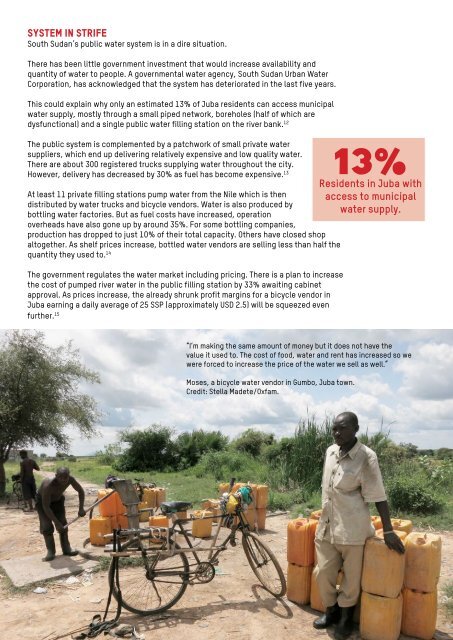You also want an ePaper? Increase the reach of your titles
YUMPU automatically turns print PDFs into web optimized ePapers that Google loves.
System in StrifeSouth Sudan’s public water system is in a dire situation.There has been little government investment that would increase availability andquantity of water to people. A governmental water agency, South Sudan Urban WaterCorporation, has acknowledged that the system has deteriorated in the last five years.This could explain why only an estimated 13% of Juba residents can access municipalwater supply, mostly through a small piped network, boreholes (half of which aredysfunctional) and a single public water filling station on the river bank. 12The public system is complemented by a patchwork of small private watersuppliers, which end up delivering relatively expensive and low quality water.There are about 300 registered trucks supplying water throughout the city.However, delivery has decreased by 30% as fuel has become expensive. 13At least 11 private filling stations pump water from the Nile which is thendistributed by water trucks and bicycle vendors. Water is also produced bybottling water factories. But as fuel costs have increased, operationoverheads have also gone up by around 35%. For some bottling companies,production has dropped to just 10% of their total capacity. Others have closed shopaltogether. As shelf prices increase, bottled water vendors are selling less than half thequantity they used to. 14The government regulates the water market including pricing. There is a plan to increasethe cost of pumped river water in the public filling station by 33% awaiting cabinetapproval. As prices increase, the already shrunk profit margins for a bicycle vendor inJuba earning a daily average of 25 SSP (approximately USD 2.5) will be squeezed evenfurther. 1513%Residents in Juba withaccess to municipalwater supply.“I’m making the same amount of money but it does not have thevalue it used to. The cost of food, water and rent has increased so wewere forced to increase the price of the water we sell as well.”Moses, a bicycle water vendor in Gumbo, Juba town.Credit: Stella Madete/Oxfam.


